Does Peppermint Oil Kill Bed Bugs: Unveiling Efficacy In Pest Control
When tackling the persistent issue of bed bugs, many individuals seek natural and safe methods before resorting to harsh chemicals. One potential solution is peppermint oil, renowned for its potent aromatic scent. Its high menthol content makes it a promising candidate in pest control, offering a more eco-friendly approach to dealing with these pesky pests.
Bed bugs are notorious for their remarkable resilience and rapid multiplication, requiring a robust strategy to control and eradicate them effectively. Peppermint oil’s effectiveness as a pest control measure relies on its potential to act as a contact insecticide, killing bed bugs when applied directly.
However, it is crucial to recognize that relying solely on peppermint oil may not be sufficient, and integrating it into a comprehensive pest management strategy could be necessary for complete elimination.
Key Takeaways
While peppermint oil has been touted as a natural means of repelling and possibly eliminating bed bugs, it’s crucial to recognize that this essential oil is most effective when used as part of a comprehensive treatment plan. A one-size-fits-all approach simply won’t cut it when it comes to eradicating these pesky pests. Instead, peppermint oil should be incorporated into an integrated pest management strategy, allowing for a multi-pronged attack on the bed bug population.
Overview of Bed Bugs
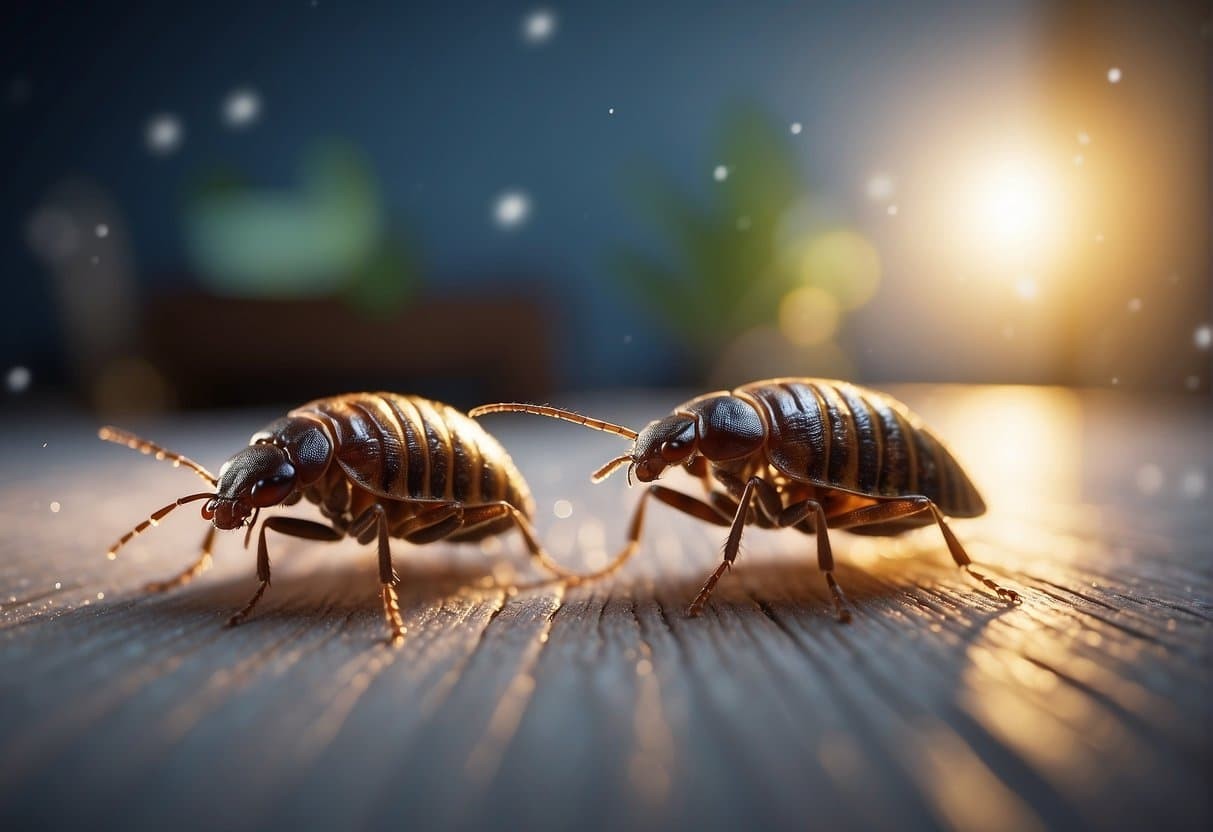
Unwelcome invaders of the night, bed bugs bring unwanted attention to your home’s most intimate spaces. In this section, we’ll delve into the world of these tiny terrors, exploring what they are and how you can identify the telltale signs of their unwelcome presence, so you can take action to reclaim your domain.
Understanding Bed Bugs
Bed bugs (Cimex lectularius) are tiny, wingless insects that exclusively feed on the blood of warm-blooded animals, with a penchant for humans. Adult bed bugs are oval-shaped, flat, and brown, measuring approximately 4-5 mm in length – roughly equivalent to an apple seed’s size. As nocturnal creatures, they emerge from their hiding places at night to feed on their hosts, leading to itchy bites and potential rash.
While bed bugs don’t transmit diseases, their presence can cause significant psychological distress and, in some cases, severe allergic reactions.
Lifecycle and Reproduction:
Bed bugs exhibit distinct life stages. Pearly white eggs measure approximately 1mm in length, while nymphs undergo five molts before reaching maturity. Adult bed bugs are capable of surviving for up to a year without feeding, provided optimal conditions are met. When it comes to habitat, these pests can thrive in various environments, but they tend to prefer areas proximal to their human hosts, such as beds, furniture, and luggage, where they can easily feed and hide from potential threats.
Identifying an Infestation
It is crucial to identify a bed bug infestation early on in order to successfully manage and eliminate it. Some telltale signs that may indicate an infestation include small, red bites often arranged in a line or cluster, blood spots in the form of rusty or reddish stains on bed sheets or mattresses resulting from crushed insects, dark excrement spots on bedding or walls, and actual sightings of the bugs hiding near mattress seams, bed frames, or other areas around your sleeping space.
If you notice red itchy welts or a persistent rash, this could be an indication that bed bugs have taken up residence in your space. Early detection is key to preventing a full-blown infestation, which can lead to larger issues such as skin infections caused by excessive scratching if left untreated.
If you suspect the presence of bed bugs, it’s essential to conduct a thorough inspection of your sleeping area and consider seeking professional pest control services to effectively address the issue.
Peppermint Oil as a Pest Control Measure
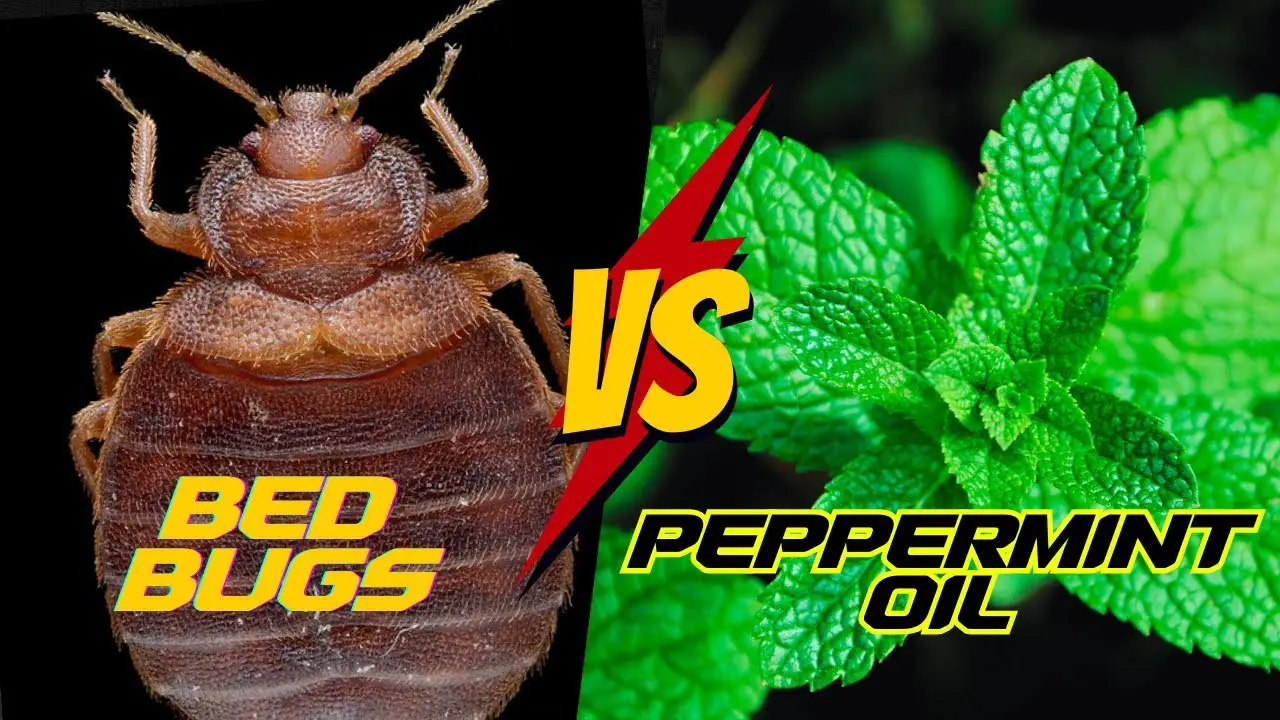
The versatility of peppermint oil in tackling bed bug infestations is underscored by its unique ability to act as both a deterrent and an active substance that comes into direct contact with the insects. This dual nature highlights the potential benefits of incorporating peppermint oil into integrated pest management strategies.
Properties of Peppermint Oil
Peppermint essential oil, extracted from the peppermint plant, is renowned for its distinctive cooling properties and potent fragrance. The high menthol content is responsible for this unique combination. As a natural and eco-friendly alternative, peppermint oil has gained popularity among those seeking to manage pests without resorting to synthetic chemicals.
Its impressive potency stems from three key characteristics: Firstly, the high concentration of menthol creates a strong aroma that many unwanted visitors find unappealing. Secondly, its essential oil status underscores the use of natural compounds rather than artificial chemicals. Thirdly, this very essence allows for a more holistic and environmentally conscious approach to pest control.
Effectiveness Against Bed Bugs
When it comes to combating bed bugs, incorporating peppermint oil into your strategy can be an effective approach. Research and personal accounts have yielded the following findings: Peppermint oil’s potent aroma creates a strong repellent effect that makes it difficult for bed bugs to tolerate, effectively discouraging them from entering the area. Additionally, the essential oil can also prove lethal when sprayed directly on the pests, although its potency relies heavily on precise application.
However, it is essential to consider certain limitations: The repellency of peppermint oil may not be long-lasting, and regular applications are necessary to maintain a bed bug-free environment. Furthermore, its contact insecticide properties mean that it will only affect bed bugs if they are directly exposed to the spray.
It’s crucial to recognize that while peppermint oil can be a valuable tool in your pest control arsenal, integrating it with a comprehensive bed bug eradication plan is necessary for achieving optimal results.
Application of Peppermint Oil for Bed Bugs
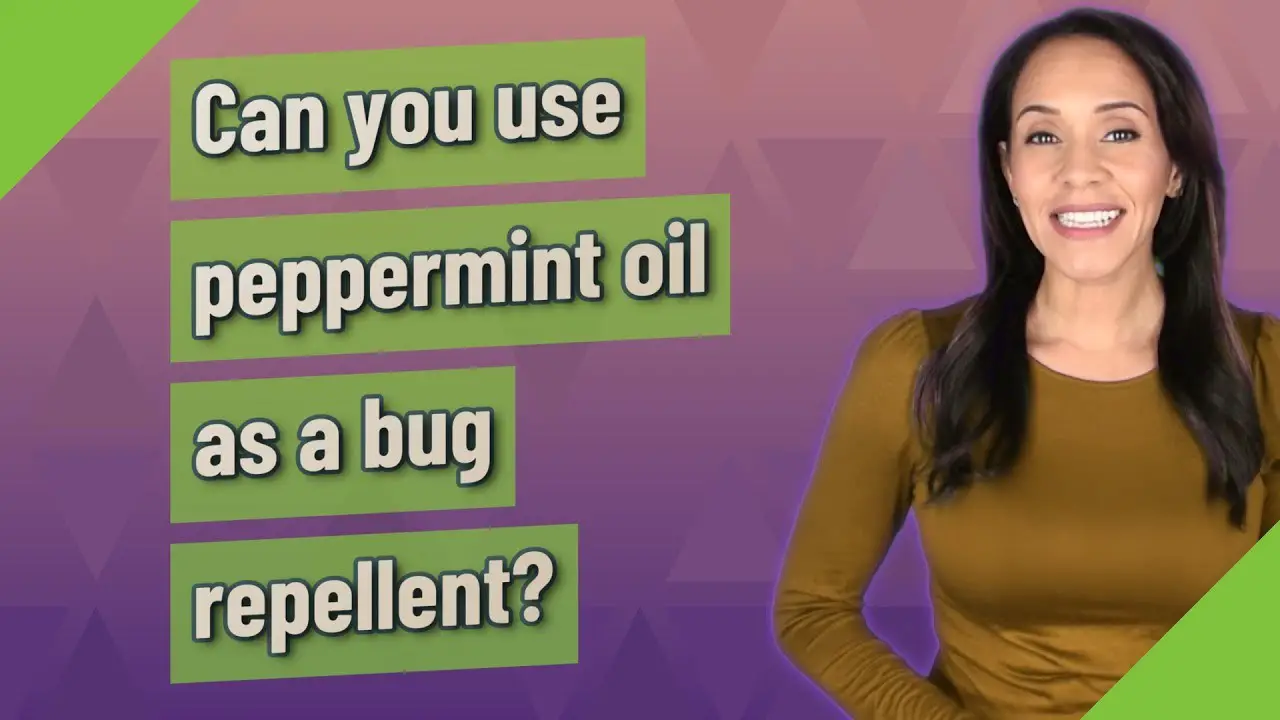
While peppermint oil may not be the first solution that comes to mind for tackling bed bug infestations, it’s actually a popular natural method used by many. The reason is simple: its strong scent is naturally repelling to these pesky pests, making it an effective deterrent and contact insecticide when applied correctly.
Creating a Peppermint Oil Spray
To create a potent peppermint oil spray, start by combining a few drops of peppermint essential oil with water in a spray bottle. For enhanced performance, you can also incorporate a small amount of carrier oil to facilitate the peppermint oil’s even distribution. Here’s a straightforward recipe to get you started:Combine 8 ounces of water with 10-15 drops of peppermint oil in a spray bottle. Optional: Add 1 teaspoon of carrier oil to improve the spray’s adhesion to surfaces.
Before each use, vigorously shake the bottle to guarantee the oil is evenly dispersed.
Correct Application Techniques
When utilizing your peppermint oil spray for effective bed bug control, it’s essential to focus on a few key areas. Start by lightly misting your bedding, allowing it to air dry before use. This will help eliminate any lingering bed bugs and their eggs. Next, target specific areas of furniture where bed bugs are more likely to hide, such as seams, under cushions, or in small crevices. Be sure to spray these areas thoroughly, taking care not to saturate the surfaces.
This can lead to damage or mold growth if left unchecked. Finally, don’t forget to apply the spray into any cracks and crevices where bed bugs might be hiding. By covering all of these areas, you’ll significantly reduce the likelihood of a bed bug infestation.
Safety Precautions
When using natural peppermint oil to repel bed bugs, it’s essential to exercise caution, especially if you have sensitive skin. To avoid any adverse reactions, consider these precautions:Firstly, always conduct a patch test on a small area of your skin before exposing yourself to the oil for an extended period. This will help identify any potential irritation. Secondly, when spraying large areas, ensure good ventilation by opening windows.
This will prevent the buildup of fumes and minimize any discomfort. Lastly, it’s crucial to avoid direct contact between the peppermint oil spray and pets or people. Instead, target specific areas where bed bugs are most active. It’s also important to remember that peppermint oil should be used as part of a comprehensive strategy for managing bed bug infestations, rather than relying solely on this natural solution.
Complementary Measures
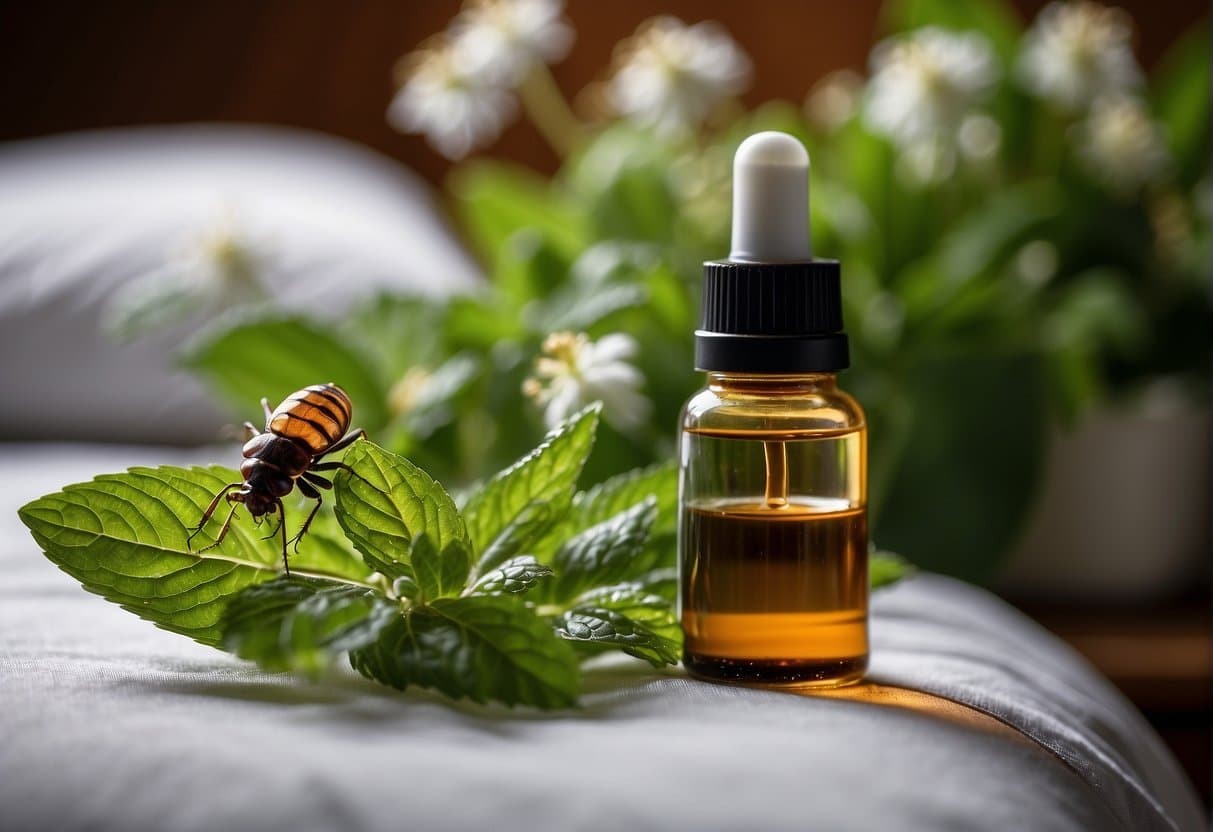
While peppermint oil may provide some benefits, effectively eliminating bed bugs demands a comprehensive plan. Supplementing peppermint oil with other tactics amplifies the likelihood of a successful eradication effort, allowing you to tackle these resilient pests with confidence.
Heat Treatment
Bed bugs are particularly vulnerable to intense heat, making it an effective way to eliminate infestations. One effective method is to employ a steamer on mattresses, furniture, and cracks where bed bugs often hide. For items that can’t be subjected to hot water, direct application of high-temperature steam using a steam cleaner provides a non-toxic solution.
Additionally, regular washing and heat-drying of bed linens and clothes at temperatures of at least 115 degrees Fahrenheit will also effectively kill bed bugs and their eggs.
Diatomaceous Earth and Silica Gel
Both diatomaceous earth (DE) and silica gel are effective bed bug eliminators because they induce desiccation, or drying out, which ultimately leads to the insects’ demise. To utilize these substances effectively, apply them liberally around potential entry points and hiding spots. Implementation: For optimal results, sprinkle a thin layer of either substance in suspect areas like baseboards and under furniture, ensuring thorough coverage.
Precautions: When using diatomaceous earth, it is crucial to opt for food-grade varieties to safeguard your household and pets from potential harm.
Additional Natural Oils and Herbs
Combining natural oils and herbs can further enhance the effectiveness of peppermint oil in repelling bed bugs. Eucalyptus, lavender, neem oil, and tea tree oil possess repellent properties that can be lethal to these unwanted pests when used in essential oil sprays. Herbal pouches filled with dried mint, clove, thyme, or rosemary can also be utilized to create sachets that repel bed bugs in areas such as drawers and closets.
To maximize results, consider combining these approaches, fostering a consistent and persistent effort to create a bed bug-free environment.
Preventive Strategies and Ongoing Maintenance
For a bed bug-free home, proactive measures and sustained upkeep are vital. To achieve this, let’s explore effective strategies for maintaining a pest-free environment and utilizing natural deterrents to ensure long-lasting control.
Maintaining a Pest-Free Environment
To maintain a pest-free home, it’s essential to adopt a routine of regular inspections and thorough housekeeping. One crucial aspect is ensuring that your bedding is clean and free from bed bugs. To achieve this, make washing your sheets, pillowcases, and blankets in hot water a weekly habit.
Decluttering your home, particularly bedrooms and living areas, can also play a significant role in reducing hiding spots for pests.
This simple step can help prevent infestations from occurring in the first place.
In addition to these steps, it’s crucial to inspect your home for any cracks or crevices, especially around windows and doors, and seal them to prevent pests from entering your home.
Furthermore, when acquiring second-hand furniture, it’s vital to conduct a thorough inspection before bringing it into your home.
This can help prevent the introduction of unwanted pests that may have been hiding in the furniture.
Natural Repellents for Long-Term Control
When it comes to natural pest management, essential oils like peppermint oil offer a promising solution. Its potent aroma has been anecdotally linked to repelling not only bed bugs but also mosquitoes, spiders, and cockroaches. To harness the power of peppermint oil, you can create a DIY repellent by mixing it with water. This simple spray can be applied around your home as a preventative measure, providing ongoing protection against unwanted pests.
Incorporating these natural solutions into your daily routine is crucial for effective pest management. Consistency is key to prevention and maintenance, so make sure to implement these strategies regularly to keep those pesky critters at bay.
Professional Pest Control Options
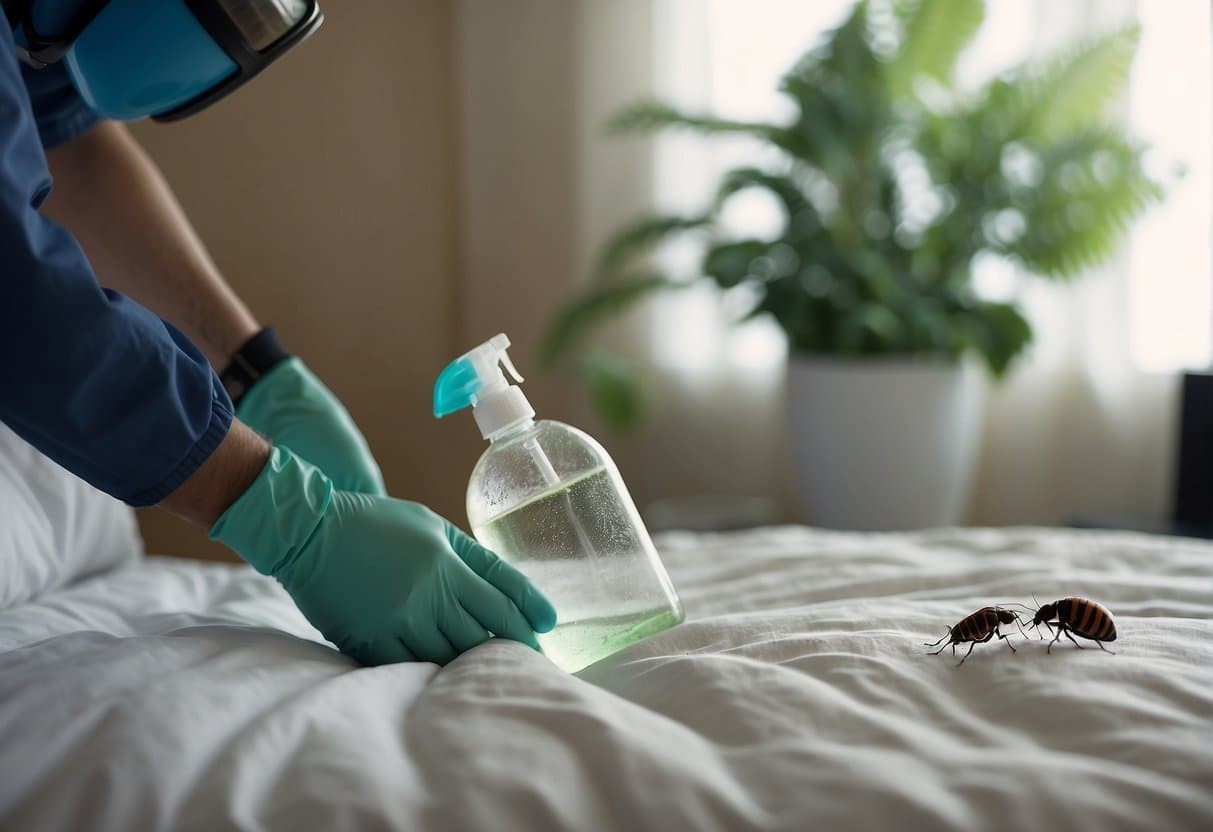
When confronting the unwelcome presence of bed bugs in one’s living space, it may become evident that DIY solutions such as using peppermint oil are insufficient. At this juncture, it is essential to be familiar with professional pest control options, as they can provide effective relief from the infestation.
When to Call an Exterminator
If you’re dealing with a stubborn bed bug problem, consider seeking the expertise of an exterminator in the following situations: when DIY treatments have fallen short of controlling the population; when the number of bites and sightings is alarmingly high; or when you want a comprehensive, professional assessment and treatment to guarantee a pest-free home.
Exterminators bring their specialized knowledge to the table, conducting a thorough inspection to pinpoint the infestation sites and crafting a customized plan to effectively eradicate the pests.
Chemical Treatments and Alternatives
Professional pest control typically employs a range of tools and methods to effectively eliminate bed bug infestations. While pesticides, including insecticides, are often utilized, there are also non-chemical alternatives that can be explored. Pyrethrins and pyrethroids, for instance, are common chemical compounds used in bed bug treatments. However, these harsh chemicals may require vacating the premises for a period of time to ensure safety.
For those concerned about chemical exposure, it’s essential to discuss alternative options with your pest control provider. Heat treatments, which raise room temperatures to lethal levels for bed bugs, and cryonite treatments, which utilize extreme cold to exterminate the pests, are two examples of non-chemical methods that can be employed. When selecting a pest control service, it’s crucial to work with licensed and experienced professionals who prioritize both safety and efficacy.
Health Considerations and Remedies
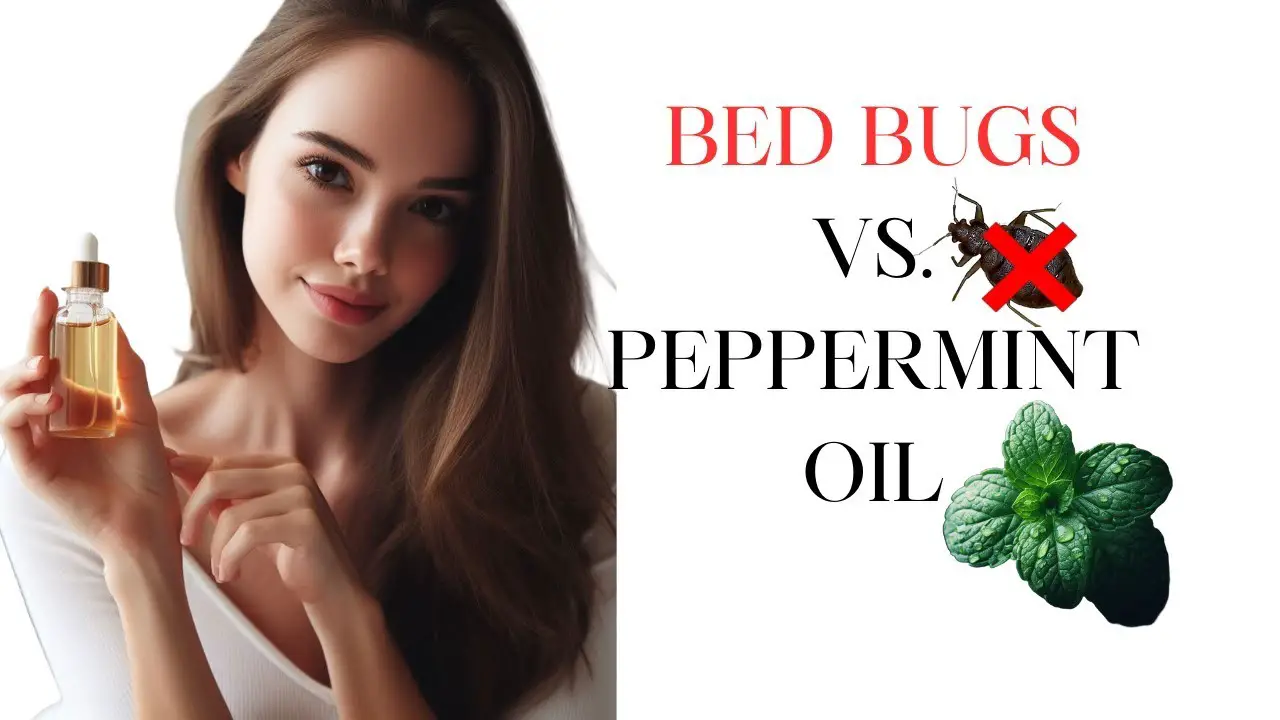
To tackle the pesky problem of bed bugs, it’s essential to strike a balance between addressing health concerns and exploring natural remedies that can provide relief from discomfort and prevent potential complications.
Dealing With Bed Bug Bites
Bed bug bites can be quite problematic, causing not only unpleasant skin irritation but also intense itching that can disrupt your daily routine. To quickly alleviate these symptoms and prevent infection, it’s essential to thoroughly clean the affected area with rubbing alcohol. However, avoid scratching as much as possible, as this can lead to open wounds that are more susceptible to bacterial infections.
In addition to prompt cleaning, there are a few other remedies you can try to find relief from bed bug bites. Applying a cold compress can help numb the area and provide temporary itch relief. You can also use over-the-counter creams containing hydrocortisone to ease skin irritation. With these simple steps, you can reduce the discomfort associated with bed bug bites and get back to your normal activities sooner.
Natural Remedies and Aromatherapy
Individuals seeking gentler approaches often turn to natural remedies for relief from bed bugs. Certain essential oils like clove, lavender, and peppermint contain compounds such as eugenol, geraniol, carvacrol, and thymol that can exhibit natural repellent properties. To harness their potential, consider the following: Peppermint oil’s potent scent can deter bed bugs, though it’s crucial to note that its primary function is repelling rather than killing them.
Consider adding a few drops to your laundry for a fresh, bug-deterrent fragrance. Neem oil, renowned for its antibacterial and anti-fungal properties, can be mixed with coconut or olive oil and applied to bites to soothe irritation. It’s essential to remember that while natural oils may provide relief, they should be employed as part of a comprehensive bed bug eradication and skin care strategy rather than relied upon as a standalone solution.
Integrating Peppermint Oil Into a Larger Pest Management Strategy
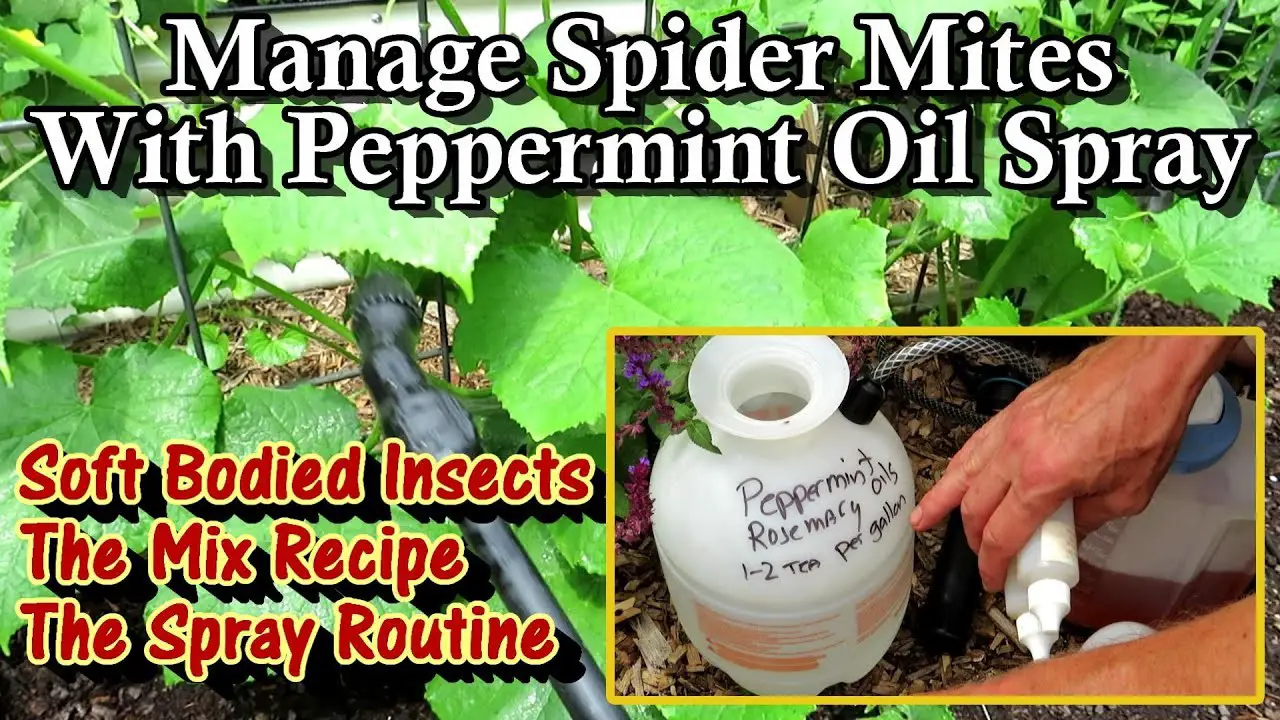
When tackling bed bug infestations, peppermint oil can be a valuable addition to your arsenal of natural pest control methods. However, it’s essential to recognize that this oil shouldn’t be relied upon solely for elimination.
To effectively incorporate peppermint oil into your strategy, follow these steps: Combine the oil with hot water in a ratio of 5-10 drops per ounce, then fill a spray bottle and apply the mixture carefully to potential bed bug hideouts, such as mattresses, bed frames, and baseboards. Be aware that while peppermint oil may deter bed bugs, it’s not a guaranteed kill method; regular application is crucial for optimal results.
To amplify your efforts, consider combining peppermint oil with other methods: utilize biological solutions like Bed Bug Patrol products to further reduce populations, incorporate desiccants such as diatomaceous earth or silica gel to dehydrate and kill bed bugs over time, and maintain a thorough cleaning routine that includes vacuuming carpets, upholstered furniture, and bed areas to physically remove bed bugs.
By integrating peppermint oil into a comprehensive pest management plan, you’ll enhance your approach. Always follow product instructions and ensure any method is safe for your household. Remember that infestations can be persistent, and significant results may take time; patience and persistence, paired with a well-rounded strategy, can ultimately help you reclaim your home from these unwanted pests.
Frequently Asked Questions
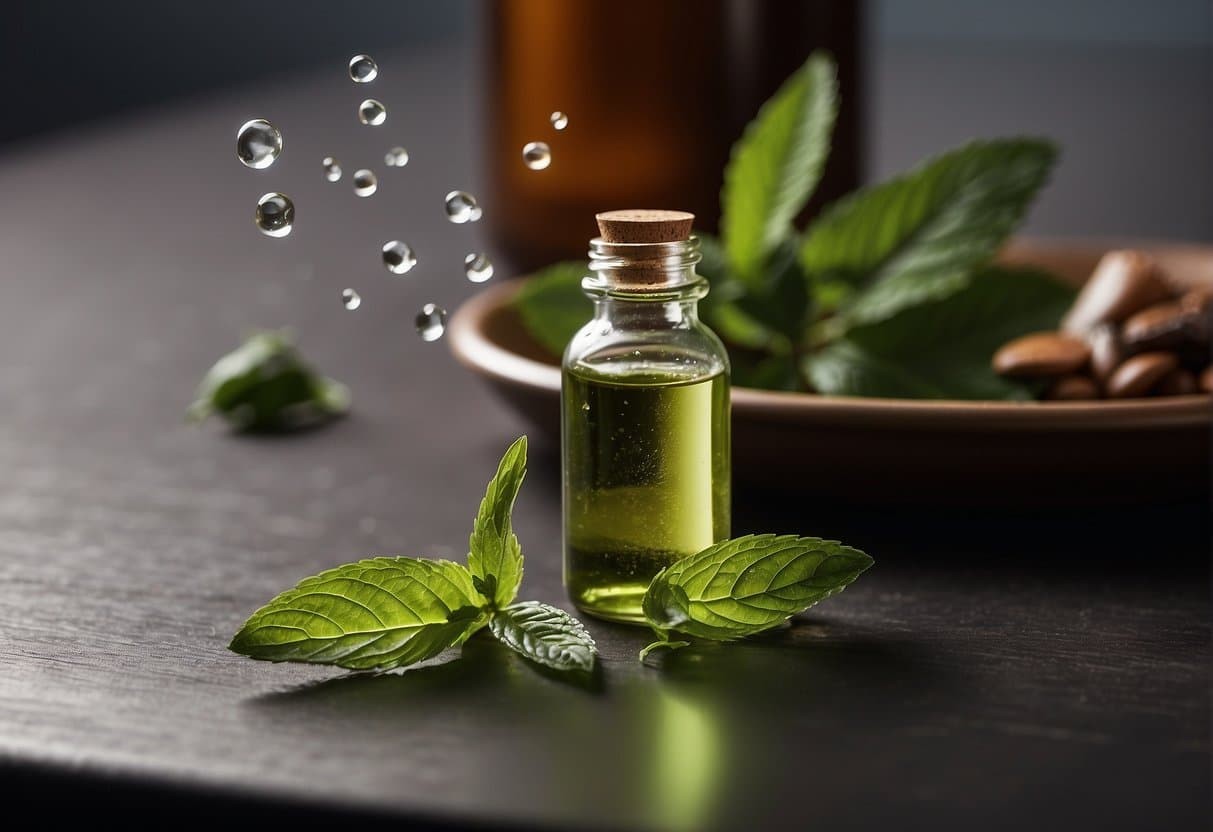
When exploring natural solutions for tackling bed bugs, peppermint oil often emerges as a popular choice. To shed light on its effectiveness, let’s address the most pressing questions that come up in this regard.
How effective is peppermint oil in repelling bed bugs?
While peppermint oil may possess some natural deterrent qualities against bed bugs, its primary active compound, menthol, can prove unpalatable to these pests. However, it’s essential to recognize that peppermint oil’s effectiveness as a repellent is somewhat limited and should not be relied upon exclusively for bed bug control.
What essential oils are known to kill bed bugs on contact?
While peppermint oil has gained attention for its ability to repel bed bugs, other essential oils like tea tree, lavender, and eucalyptus also possess properties that can eliminate these pests on contact. It’s important to note, however, that the effectiveness of these oils varies and they should not be relied upon as a single solution for comprehensive bed bug eradication.
Can peppermint oil eliminate bed bug infestations?
While using peppermint oil as a standalone solution may not be enough to completely eradicate a bed bug infestation, it’s essential to acknowledge its limitations. Bed bugs are notorious for their ability to adapt and evolve, making significant infestations often require a comprehensive approach that involves professional treatment methods. A single-pronged strategy is unlikely to yield the desired results in these cases.
What are the best ways to apply peppermint oil for bed bug control?
To effectively repel pests using peppermint oil in localized areas, mix it with water and apply it liberally around high-risk zones like beds, couches, and chairs. For optimal results, reapply the mixture regularly to maintain the scent, which tends to fade over time, compromising its repellent properties.
Are there any plants that can naturally deter bed bugs?
While there are no plants that have been scientifically proven to keep bed bugs at bay solely through their presence, certain plant-derived oils have been employed as part of integrated pest management strategies. For instance, peppermint oil has been used in attempts to repel these unwanted pests. Nevertheless, it’s essential to recognize that effective bed bug control typically requires a comprehensive approach that goes beyond relying on natural remedies alone.
How does the use of peppermint oil compare with other methods of bed bug extermination?
While peppermint oil can be used as a potential deterrent for bed bugs, its effectiveness is significantly overshadowed by established methods such as heat treatment, insecticides, and professional extermination services. While peppermint oil may offer some temporary repelling benefits, it is not a reliable or comprehensive solution for dealing with bed bug infestations. Professional-grade treatments are generally more effective in providing long-term relief from these pests.
References:
Bed bugs (Cimex lectularius) are a common pest found in homes and other buildings. These small, flat insects feed on human blood and can cause significant discomfort and anxiety. While there are many ways to manage bed bug infestations, some individuals have turned to peppermint oil as a potential solution. Research has shown that peppermint oil can be effective at repelling and killing bed bugs.
For example, a study published in the journal Molecules found that contact with peppermint oil was toxic to bed bugs, while another study discovered that the oil’s gastric effects could also be beneficial in controlling bed bug populations. In addition to its potential use as a pesticide, peppermint oil has also been touted for its ability to alleviate symptoms of bed bug bites, such as itching and inflammation.
Some people have even used peppermint oil as part of a comprehensive approach to getting rid of bed bugs, combining it with other methods like steam cleaning and using mattress encasements. The US Environmental Protection Agency (EPA) has provided guidelines on how to protect your home from bed bugs, including information on pesticides that can be used to control infestations.
The EPA also offers resources on the importance of proper pest management and the risks associated with using certain pesticides.






